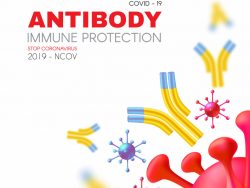 Due to the millions of cases of COVID-19 reported worldwide, people are looking to antibody tests to see whether they have been exposed to the coronavirus that leads to the disease. Questions have arisen in regards to what exactly are antibodies and why are they important? People wonder if they have them are they immune to COVID-19 and if not why? Can a person be injected with antibodies as a treatment or preventative?
Due to the millions of cases of COVID-19 reported worldwide, people are looking to antibody tests to see whether they have been exposed to the coronavirus that leads to the disease. Questions have arisen in regards to what exactly are antibodies and why are they important? People wonder if they have them are they immune to COVID-19 and if not why? Can a person be injected with antibodies as a treatment or preventative?
Antibody tests are conducted to see if there is a presence of antibodies which are specific proteins that are made in response to infections and they are disease specific. For example, measles antibodies will protect a person from getting the measles if they are exposed to the disease again, however they won’t protect a person from getting the mumps if they are exposed to the mumps.
Antibodies are very important as they prevent infection and heal patients that have been infected by diseases. If a person has antibodies they are immune to a disease as long as they remain in the person’s system. If someone does not have antibodies, then infection will proceed and the pandemic continues.
This foreign antibody based protection is known as passive immunity which is short term immunity provided when a person is given antibodies to a particular disease rather than producing these antibodies through their own immune system.
Research was conducted at The Catholic University of America in Washington D. C. by Victor Padilla-Sanchez into the initial steps of antibody protection. He specializes in viruses and uses computer models to understand the structure of viruses on the molecular level. This information is then used to try to understand how the virus functions.
SARS was the first new infectious disease identified in the 21st century. This particular respiratory illness originated in China in November 2002 and the WHO identified this new coronavirus (SARS-CoV) as the agent that led to this outbreak.
We are now in the middle of the new coronavirus (SARS-CoV-2) which emerged in Wuhan, China in 2019 and is known as COVID-19. To date there are no vaccines or therapeutics to fight this illness.
Both of these illnesses share the same spike protein, the entry key that allows the virus into human cells. The team’s idea was to take the antibodies found in the 2002 outbreak (80R and m396) and re-engineer them to fit the current COVID-19 virus.
Through using computer stimulation, Padilla-Sanchez discovered that differences in sequences prevent 80R and m396 from binding to COVID-19. Understanding why these antibodies did not bind to the SARS-CoV-2 spike protein might pave the way to engineering new antibodies that are effective. Mutated versions of the two antibodies can be produced and administered as a therapeutic to fight the disease and prevent infection.
Padilla-Sanchez’s docking experiments indicated that amino acid substitutions in 80R and m396 should increase binding interactions between the two antibodies and SARS-CoV-2 which would provide new antibodies to neutralize the virus. His next step is to prove it in the lab.
The docking experiments were ran on Stampede2 using Rosetta software suite which includes algorithms for computational modeling and analysis of protein structures. This software binds the proteins then provides a score for each binding experiment. If a good docking position can be found, then it can be recommended that this new, mutated antibody should go to production.
Currently a variety of labs across the globe are already testing vaccines. If a vaccine isn’t found in the near term we still have passive immunity which can prevent infection for several months as long as a person has the antibodies. Passive immunity might be a fast track in providing relief for the pandemic.
To view the original scientific study click below
In silico analysis of SARS-CoV-2 spike glycoprotein and insights into antibody binding.





